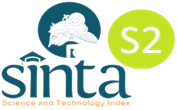MOTIVASI DAN HASIL BELAJAR KOGNITIF SISWA MELALUI MODEL PEMBELAJARAN INKUIRI TERBIMBING
DOI:
https://doi.org/10.33477/bs.v7i2.648Abstract
Penelitian ini bertujuan untuk mengetahui pengaruh model pembelajaran inkuiri terbimbing terhadap motivasi dan hasil belajar kognitif. Penelitian merupakan eksperimen semu dengan desain pretest-possttest non equivalent control group design. Populasi penelitian adalah seluruh siswa kelas XI Madrasah Aliyah Madani Alauddin Paopao yang berjumlah 95 siswa. Besarnya sampel ditetapkan sebanyak 60 siswa. Penentuan sampel yaitu secara acak kelas. Instrumen penelitian yang digunakan berupa angket motivasi dan tes hasil belajar kognitif. Data dianalisis dengan statistik inferensial analisis kovarian (anakova). Hasil penelitian menunjukkan bahwa penerapan model pembelajaran inkuiri terbimbing berpengaruh secara signifikan terhadap motivasi dan hasil belajar kognitif.References
Buttler, D, 2011. Getting Going with Autograph 3, Eastmond Publishing Ltd, UK
Carlson, J. L. 2008. Effect of Theme-based Guided Inquiry Instruction on Science Literacy in Ecology. (Thesis). Michigan Tecnological University. Washington DC.
Hamalik, O. 2012. Strategi Belajar Mengajar Berdasarkan CBSA. Bandung: CV Sinar Baru.
Ibrahim. 2000. Pembelajaran Kooperatif Pusat Sains dan Matematika Sekolah Program Pasca Sarjana Unesa. Surabaya: University Press.
Kubicek, J.P. 2005. Inquiry-Based Learning, The Nature of Science, and Computer Technology: New Possibilities in Science Education. Canadian Journal of Learning and Technology. 31(1):1—10.
Lee, M. 2009. The Effect of Guided Inquiry Laboratory on Conceptual Understanding. Tesis. (Online). California State University, Northridge.
Levine, M. 2002. A Mind at a Time. New York: Simon & Schuster.
Lie, A. 2004. Cooperatif Learning Mempratekkan Cooperative Learning di Ruang-Ruang Kelas. Jakarta: Grasindo.
Rijal, M. and Sere, I., 2017. SARANA BERFIKIR ILMIAH. Biosel: Biologi Science and Education, 6(2), pp.176-185.
Rijal, M., 2018. PENERAPAN MODEL PEMBELAJARAN KOOPERATIF TIPE NUMBERED HEADS TOGETHER DALAM MENINGKATKAN AKTIVITAS DAN HASIL BELAJAR COGNITIF SISWA KELAS VIII DI SMP NEGERI 14 AMBON. Jurnal BIOEDUIN: Program Studi Pendidikan Biologi, 8(2), pp.6-16.
Rijal, M., 2013. MODEL STAD (STUDIENT TEAMS ACHIEVEMENT DEVISION) DALAM MENINGKATKAN HASIL BELAJAR COGNITIF SISWA. Biosel: Biologi Science and Education, 2(2), pp.150-158
Saham, C. 2013. Peningkatan Motivasi, Aktivitas, dan Hasil Belajar Kognitif Biologi dengan Menggunakan Model Pembelajaran Two Stay Two Stray Pada Materi Kelangsungan Hidup Organisme Siswa Kelas IX2 SMP Negeri 3 Sungguminasa. Tesis Tidak diterbitkan. Makassar: Program Pascasarjana Universitas Negeri Makassar.
Slameto. 2003. Belajar dan Faktor-Faktor yang Mempengaruhinya. Jakarta: Rineka Cipta.
Sopah, J. 2000. Pengaruh Model Pembelajaran dan Motivasi Berprestasi Terhadap Hasil Belajar. Jurnal Pendidikan dan Kebudayaan, (online), jilid 1, No. 22.
Sugiyono. 2010. Metode Penelitian Pendidikan Pendekatan Kuantitatif, kualitatif, dan R&D. Bandung: Alfabeta
Trianto. 2010. Mendesain Model Pembelajaran Inovatif-Progresif. Jakarta: Kencana.
Downloads
Published
Issue
Section
License
Authors who publish with this journal agree to the following terms: Authors retain copyright and grant the journal right of first publication with the work simultaneously licensed under a Creative Commons Attribution License that allows others to share the work with an acknowledgement of the work's authorship and initial publication in this journal. Authors are able to enter into separate, additional contractual arrangements for the non-exclusive distribution of the journal's published version of the work (e.g., post it to an institutional repository or publish it in a book), with an acknowledgement of its initial publication in this journal. Authors are permitted and encouraged to post their work online (e.g., in institutional repositories or on their website) prior to and during the submission process, as it can lead to productive exchanges, as well as earlier and greater citation of published work.














